




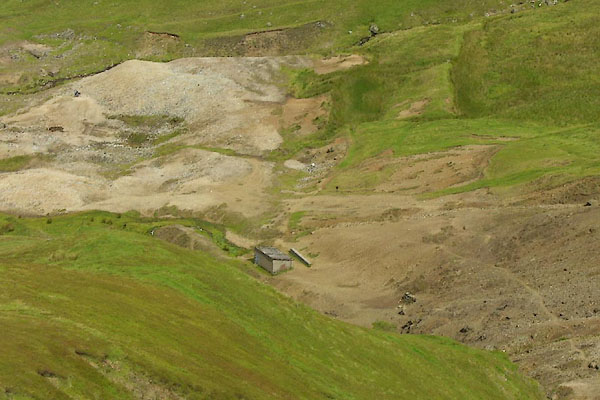
BNZ02.jpg Works.
(taken 15.8.2007)
placename:- Roughtongill Mining Works
"Roughtongill Mining Works (Lead) / Level / Smithy"
placename:- Mynes, The
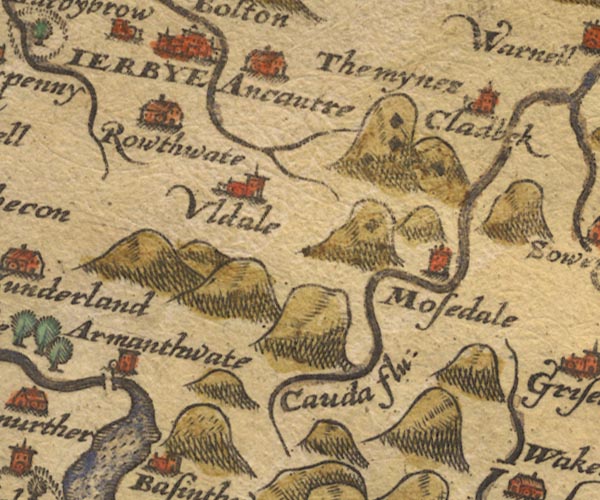
Sax9NY23.jpg
"The mynes"
4 or 5 black diamond shapes, the mine holes, in the hillocks N of Mosedale.
item:- private collection : 2
Image © see bottom of page
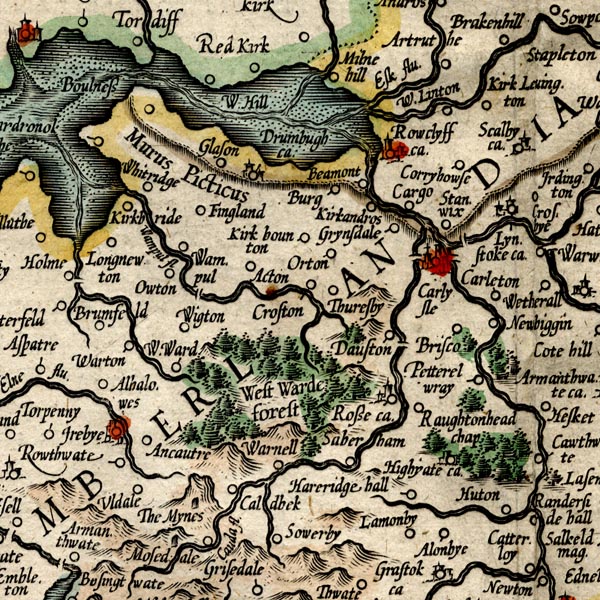
MER8CumC.jpg
"The Mynes"
?caverns on Caldbeck Fell
item:- JandMN : 169
Image © see bottom of page
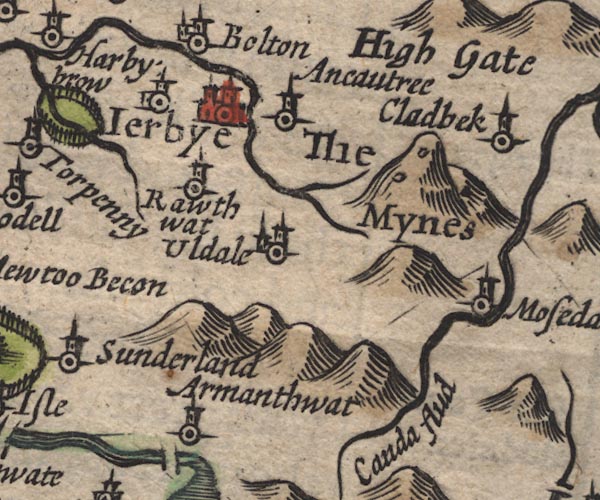
SP11NY23.jpg
"The Mynes"
two ?adits on a hillock
item:- private collection : 16
Image © see bottom of page
 goto source
goto sourcepage 166:- "...
But Westward [Forest] ... by her more widened Slade.
Of more abundance boasts, as of those mighty Mynes,
Which in her Verge she hath: ..."
placename:- Mynes, The
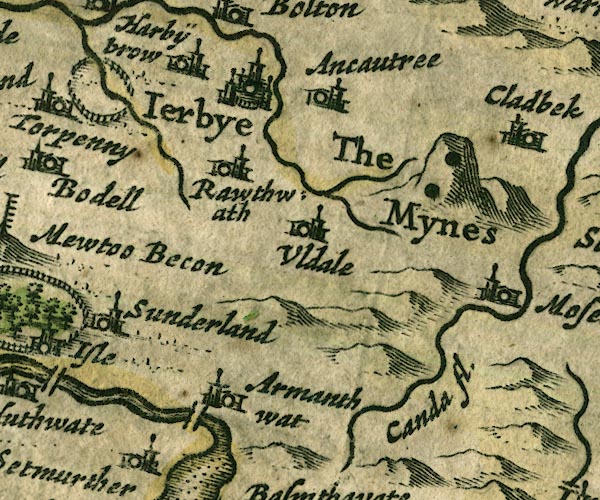
JAN3NY23.jpg
"The Mynes"
Two black spots drawn on the hillock.
item:- JandMN : 88
Image © see bottom of page
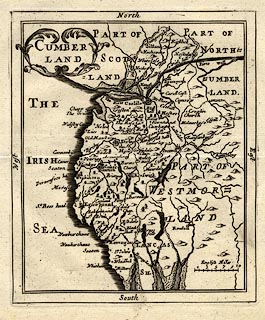 click to enlarge
click to enlargeSEL9.jpg
"the Myne"
two spots; mines
item:- Dove Cottage : 2007.38.89
Image © see bottom of page
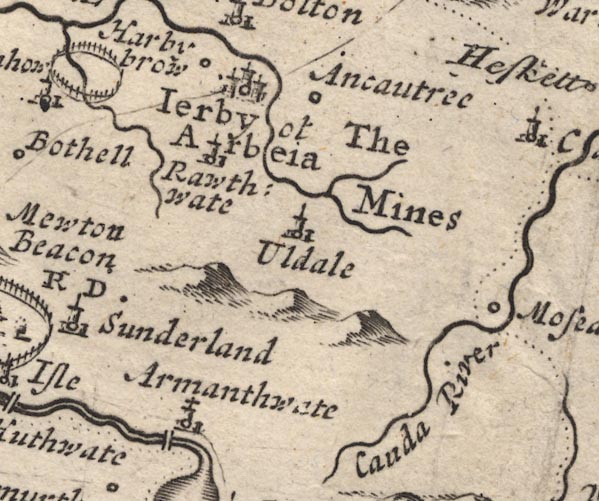
MD12NY23.jpg
"The Mines"
No symbols.
item:- JandMN : 90
Image © see bottom of page
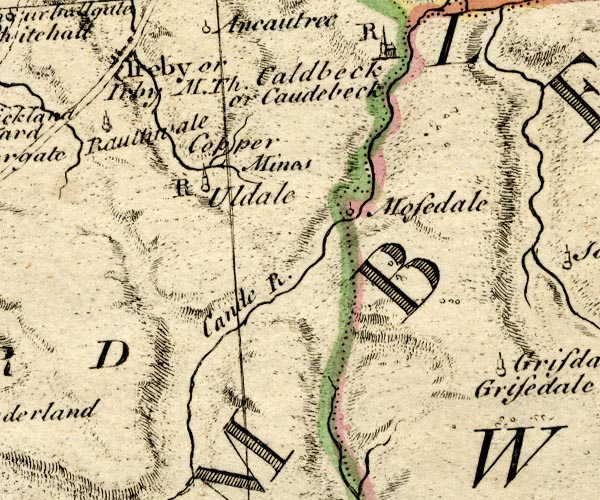
BO18NY23.jpg
"Copper Mines"
in hills near Uldale
item:- Armitt Library : 2008.14.10
Image © see bottom of page
 goto source
goto sourcePage 174:- "..."
"On the Caude, besides the copper mines at Caudebeck, ..."
placename:- Roughtengill Mine
item:- lead ore; zinc ore; iron pyrites; manganese; barytes; galena; silver; smelter
 goto source
goto sourcepage 129:- "ROUGHTENGILL MINE."
"Roughtengill has been the most productive mine in the Caldbeck Fells District, both as regards the quantity and variety of its ores and minerals. It is also the oldest having been wrought extensively before the use of gunpowder was known, and there are traces of several ancient smelting hearths, which prove that lead ore has been smelted here at a very early period. In 1794 large and commodious smelting works were erected near this mine, but they soon fell into disuse, and were afterwards converted into cottages. The mine is situated about four miles south-west of Caldbeck; it embraces two parallel veins, about eleven fathoms apart, the bearings of which are about fifteen degrees south of west and north of east, and a cross course, which runs about twenty degrees north of west and south of east, and intersects the other veins diagonally. Immense numbers of strings also intersect the veins, and often produce ore at the points of intersection. These veins yield no less than twenty-three distinct minerals, consisting chiefly of different varieties of lead, copper, and zinc ores, together with manganese, iron pyrites, barytes, &c.*"
"The old workings in Roughtengill, which have been cut with stope and feather, are very extensive, reaching downwards from the point where the mine was first opened, to a depth of twenty fathoms. The blue galena and copper ores alone, had been removed by the old men, while the various coloured decomposition products"
"*The great variety of ores and minerals found in these veins, is probably due in part to the mineral character of the enclosing rocks, the igneous rocks of the Caldbeck Mountains."
 goto source
goto sourcepage 130:- "of lead were left, showing that the miners of those days were not aware of the value of the latter; but their successors have profited by it, and have obtained many hundreds of tons from the old refuse. After the introduction of gunpowder into mining, three lower adits were driven, namely, the thirty, sixty, and ninety fathom levels; a shaft has also been sunk to a depth of twenty fathoms below the ninety fathom level. During these operations large quantities of lead, copper, and zinc ores were raised, varying in the aggregate from 60 to 100 tons per month. It became exhausted, however, and was closed about thirty-five years ago, but was re-opened - 1888 - for the purpose of raising barytes and umber."
"The proprietors of this mine also held and worked Carrock End, Drygill, and Silvergill Mines."
placename:- Roughtengill Mine
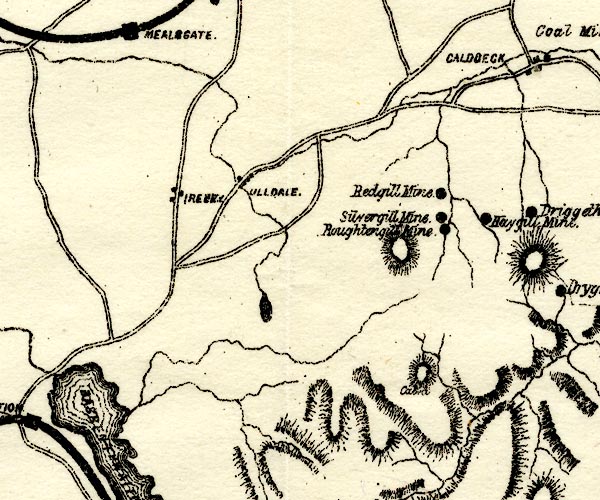
PST2NY23.jpg
"Roughtengill Mine"
mine symbol
item:- JandMN : 162.2
Image © see bottom of page
placename:- Silvergill Mine

PST2NY23.jpg
"Silvergill Mine"
mine symbol
item:- JandMN : 162.2
Image © see bottom of page
placename:- Roughton Gill Mines
item:- agate; malachite; brochanite; copper pyrites; pyromorphite; azurite
Geological Outing of the Kendal and District Mine Research Society
Log book page 15:- "DATE - 27/5/79 SUNDAY. / MAP REF - (SHEET 33) 3025/3450 / LOCATION - ROUGHTON GILL CALDBECK / NAME - ROUGHTON GILL MINES / TYPE OF SITE - MINES. / WORKING OR DISUSED - DISUSED / PEOPLE IN PARTY [ ] / NOS. OF PHOTOS - 13 / SPECIMENS FOUND - PIECES OF AGATE, MALACHITE BROCHANITE, COPPER PYRITES, PYROMORPHITE AND AZURITE. / COMMENTS - SHOWERY DAY, BUT WARM. NO LEVELS OPEN TO ENTER. VERY INTERESTING AREA."
item:- private collection : 82
Image © see bottom of page
Adams, John: 1988: Mines of the Lake District Fells: Dalesman Books (Lancaster, Lancashire):: ISBN 0 85206 931 6
